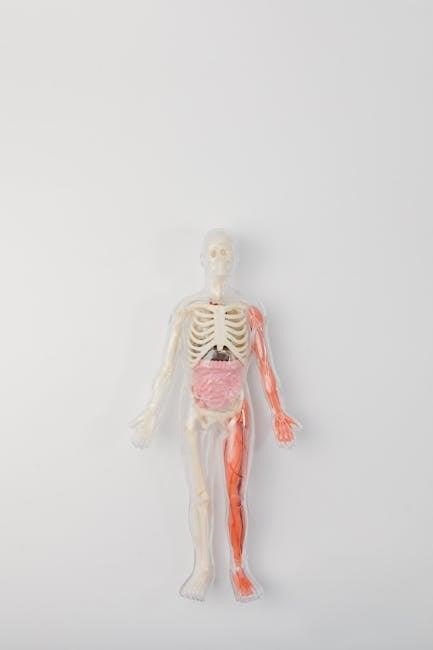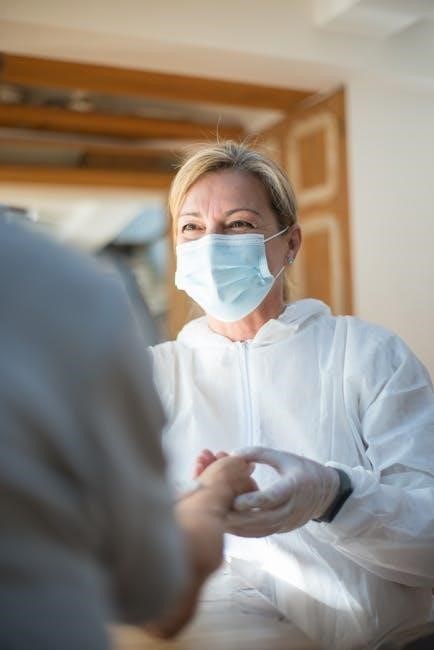fundamentals of nursing 1st year pdf

Nursing fundamentals form the cornerstone of nursing education‚ focusing on essential skills and concepts. These foundational principles ensure safe‚ effective‚ and compassionate patient care.
1.1 Importance of Nursing Fundamentals in the First Year
Nursing fundamentals are crucial in the first year as they establish a strong foundation for future learning and practice. These basics ensure safe‚ effective‚ and compassionate patient care‚ emphasizing essential skills like infection control‚ patient assessment‚ and communication. Mastery of these concepts is vital for building confidence and competence‚ enabling students to progress successfully in their nursing education and practice. Access to resources like PDF notes and solved question papers further supports understanding and retention of these critical principles.
1.2 Overview of the Nursing Curriculum for First-Year Students
The first-year nursing curriculum is comprehensive‚ focusing on foundational subjects like Anatomy‚ Physiology‚ and Nursing Fundamentals. It includes core areas such as Nutrition‚ Biochemistry‚ Psychology‚ and Microbiology‚ aligned with the INC syllabus. Resources like PDF notes and solved question papers are widely available‚ providing detailed answers and study materials. The curriculum emphasizes both theoretical and practical learning‚ ensuring students gain essential knowledge and skills. This structured approach prepares students for clinical exposure and hands-on training‚ laying a solid base for their nursing career.

Key Topics Covered in Nursing Fundamentals
Nursing fundamentals include Anatomy‚ Physiology‚ Nursing Skills‚ Patient Assessment‚ and Care Planning. These topics build a strong foundation for understanding patient care and clinical practices effectively.
2.1 Anatomy and Physiology Basics
Anatomy and Physiology are core subjects in nursing fundamentals‚ focusing on the structure and functions of the human body. These topics are essential for understanding how the body works and how diseases develop. Detailed PDF notes and study materials are available‚ covering key concepts like cells‚ tissues‚ organs‚ and systems. These resources include solved questions and examples‚ helping students grasp complex topics. The content is designed according to the INC syllabus‚ ensuring comprehensive coverage for first-year nursing students. Mastering these basics is crucial for providing effective patient care and understanding clinical practices.
2.2 Nursing Skills and Procedures

Nursing skills and procedures are vital for delivering high-quality patient care. These include foundational techniques like Vital Signs assessment‚ medication administration‚ and wound care. Detailed PDF notes provide step-by-step guides‚ ensuring students master these skills. Resources often include solved questions and practical examples‚ aligning with the INC syllabus. These materials are designed to help students apply theoretical knowledge in real clinical settings‚ enhancing their confidence and competence. Regular practice and review of these procedures are essential for first-year nursing students to excel in their training and patient interactions.
2.3 Patient Assessment and Care Planning
Patient assessment and care planning are foundational skills in nursing‚ focusing on evaluating a patient’s physical‚ emotional‚ and psychological needs. Nurses gather data through observations‚ interviews‚ and physical exams to create individualized care plans. These plans outline specific goals‚ interventions‚ and outcomes‚ ensuring holistic and evidence-based care. Detailed PDF notes provide structured frameworks for conducting assessments and developing care plans‚ aligning with the INC syllabus. Regular practice with solved questions and case studies enhances students’ ability to apply these concepts effectively in clinical settings.

Study Resources for Nursing Students
Study resources like PDF notes‚ online platforms‚ and previous year papers are essential for nursing students. They aid in exam preparation and understanding key concepts effectively.
3.1 Recommended PDF Notes for First-Year Nursing Students
PDF notes are a valuable resource for first-year nursing students‚ offering detailed insights into key subjects like Anatomy‚ Physiology‚ and Nursing Fundamentals. These notes‚ available on platforms like NotesWallah.In‚ cover essential topics such as Nutrition‚ Biochemistry‚ and Psychology‚ aligning with the INC syllabus. They include solved questions and answers from the past 15 years‚ providing a comprehensive study guide. Unit-wise organization makes them easy to follow‚ ensuring students grasp fundamental concepts. Accessible for free‚ these PDFs are a reliable tool for exam preparation and understanding complex nursing principles.
3.2 Online Platforms for Downloading Nursing Notes
Several online platforms offer free access to nursing notes‚ including NotesWallah.In and Scribd. These platforms provide PDF notes for subjects like Anatomy‚ Physiology‚ and Nursing Fundamentals. They also offer previous year question papers and solved answers based on the INC syllabus. Users can download unit-wise notes‚ lecture materials‚ and study guides tailored for BSc Nursing and GNM students. These resources are designed to aid exam preparation and deepen understanding of key concepts‚ making them indispensable for first-year nursing students aiming to excel in their studies.
3.3 Previous Year Question Papers and Mock Tests
Previous year question papers and mock tests are invaluable resources for nursing students. These materials‚ available on platforms like NotesWallah.In‚ cover fundamental subjects such as Anatomy‚ Physiology‚ and Nursing Foundation. Mock tests simulate exam conditions‚ helping students assess their readiness and identify weak areas. Many resources include solved answers and explanations‚ aiding in better understanding and preparation. Based on the INC syllabus‚ these tools are designed to enhance exam performance and build confidence for first-year nursing students.

Practical Aspects of Nursing Fundamentals


Practical aspects of nursing fundamentals are the cornerstone of effective patient care. Clinical exposure and hands-on training enable students to apply theoretical knowledge in real-world scenarios. Simulation-based learning enhances skill mastery‚ ensuring competence and confidence in delivering quality care.
4.1 Clinical Exposure and Hands-On Training
Clinical exposure and hands-on training are vital for first-year nursing students‚ bridging theoretical knowledge with practical application. These experiences allow students to develop essential skills in patient care‚ such as vital sign assessment‚ medication administration‚ and wound care. Supervised by experienced nurses‚ students gain confidence in real-world scenarios‚ enhancing their ability to provide safe and compassionate care. This practical learning environment fosters critical thinking and problem-solving‚ preparing students to meet the demands of the nursing profession effectively.
4.2 Nursing Skills Lab and Simulation-Based Learning
Nursing skills labs and simulation-based learning provide controlled environments for students to practice and master clinical skills. These labs offer hands-on experience with medical equipment and procedures‚ allowing students to apply theoretical knowledge in practical scenarios. Simulation-based learning uses realistic patient scenarios to enhance decision-making and critical thinking. These tools bridge the gap between classroom learning and real-world patient care‚ ensuring students are well-prepared for clinical rotations and future practice. They also foster confidence and competence in performing tasks like patient assessments and procedural skills.
The Nursing Process and Its Application
The nursing process is a systematic‚ patient-centered method for delivering care. It involves assessment‚ diagnosis‚ planning‚ implementation‚ and evaluation‚ ensuring individualized‚ evidence-based care. This cyclical process promotes critical thinking and problem-solving‚ addressing patients’ unique needs effectively.
5.1 Understanding the Five Steps of the Nursing Process
The nursing process consists of five systematic steps: assessment‚ diagnosis‚ planning‚ implementation‚ and evaluation. Assessment involves gathering patient data to identify health issues. Diagnosis defines specific patient problems or needs. Planning outlines achievable goals and interventions. Implementation executes the care plan‚ while evaluation assesses its effectiveness. This cyclical process ensures personalized‚ evidence-based care‚ promoting critical thinking and continuous improvement in patient outcomes.
5.2 Case Studies and Real-Life Applications
Case studies and real-life applications bridge theoretical knowledge with practical experience. They present realistic patient scenarios‚ enabling students to apply nursing fundamentals in simulated clinical settings. Through analyzing these cases‚ learners develop critical thinking and problem-solving skills. Examples include managing patient assessments‚ creating care plans‚ and evaluating outcomes. These exercises prepare future nurses for diverse clinical challenges‚ fostering a deeper understanding of patient-centered care and evidence-based practices. Real-life applications enhance learning by connecting classroom concepts to actual patient situations‚ ensuring readiness for professional practice.

Health and Safety in Nursing Practice
Health and safety are critical in nursing‚ focusing on infection control‚ hygiene‚ and safe practices to protect patients and staff. Proper protocols ensure a safe care environment.
6.1 Infection Control and Hygiene Practices
Infection control and hygiene are vital in nursing to prevent the spread of infections. Proper handwashing‚ use of personal protective equipment (PPE)‚ and sterilization of surfaces are essential practices. Nursing students are taught to follow strict protocols‚ including wearing gloves and masks when interacting with patients. Regular cleaning and disinfection of equipment and environments further reduce infection risks. Adhering to these practices ensures a safe and healthy environment for both patients and healthcare workers‚ making it a cornerstone of nursing care.
6.2 Patient Safety and Risk Management
Patient safety is a critical aspect of nursing practice‚ focusing on preventing harm and ensuring quality care. Nurses are trained to identify potential risks‚ such as falls‚ medication errors‚ and equipment malfunctions. Implementing safety protocols‚ like using bed alarms and double-checking medications‚ minimizes these risks. Effective communication and incident reporting systems are essential for addressing adverse events. By prioritizing patient safety‚ nurses create a secure environment that promotes recovery and well-being‚ adhering to ethical and professional standards in healthcare.
Communication Skills in Nursing
Effective communication is vital in nursing‚ ensuring clear interactions with patients‚ families‚ and healthcare teams. It involves verbal‚ non-verbal‚ and active listening skills to build trust and understanding.
7.1 Effective Communication with Patients and Families
Effective communication with patients and families is essential for building trust and ensuring quality care. Nurses must use clear‚ empathetic language‚ actively listen‚ and adapt their communication style to meet individual needs. This fosters a supportive environment‚ enabling patients to express concerns and feel understood. Open dialogue helps in accurate assessments and personalized care planning‚ ultimately improving patient outcomes and satisfaction. Nurses should also be culturally sensitive to address diverse patient backgrounds effectively. This skill is a cornerstone of compassionate nursing practice‚ emphasized in first-year nursing education.
7.2 Interprofessional Collaboration and Teamwork
Interprofessional collaboration and teamwork are vital in healthcare settings‚ ensuring comprehensive patient care. Nurses work alongside doctors‚ therapists‚ and support staff‚ requiring clear communication and mutual respect. Understanding each team member’s role fosters coordination and trust. Active participation in team discussions enhances decision-making and problem-solving. This collaborative approach improves patient outcomes and satisfaction. Nursing education emphasizes teamwork as a critical skill‚ preparing students to function effectively within multidisciplinary teams. Strong teamwork reduces errors and enhances the quality of care‚ making it a cornerstone of modern nursing practice.

Future of Nursing Education and Practice
The future of nursing education emphasizes technology integration‚ simulation-based learning‚ and personalized patient care. These advancements prepare nurses for evolving healthcare demands and dynamic patient needs effectively.
8.1 Emerging Trends in Nursing Education
Emerging trends in nursing education include the integration of technology‚ simulation-based learning‚ and personalized care approaches. These innovations enhance student engagement and prepare future nurses for complex healthcare environments. Virtual reality and AI-driven tools are transforming clinical training‚ offering immersive experiences. Additionally‚ competency-based education and interprofessional collaboration are gaining prominence‚ ensuring nurses are well-equipped to meet modern healthcare challenges. These trends emphasize adaptive learning‚ critical thinking‚ and evidence-based practices‚ shaping a dynamic and patient-centered nursing profession.
8.2 The Role of Technology in Modern Nursing
Technology is revolutionizing modern nursing‚ enhancing patient care and streamlining workflows. Electronic health records (EHRs) improve data accuracy and accessibility‚ while telehealth expands access to care. Simulation-based training and virtual reality tools enable immersive learning experiences. AI-driven systems assist with diagnostics and personalized care plans. These advancements not only boost efficiency but also empower nurses to deliver high-quality‚ patient-centered care in diverse settings‚ fostering innovation and excellence in the nursing profession.



Leave a Reply
You must be logged in to post a comment.